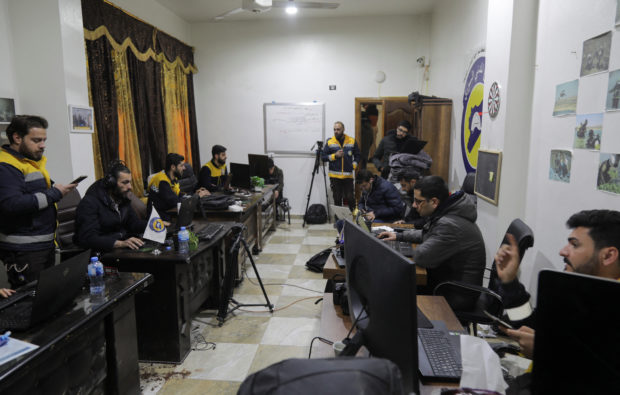
Members of the Syria Civil Defense (White Helmets) work at their media center, in the aftermath of an earthquake, in the rebel-held town of Sarmada, Syria, on February 10, 2023. REUTERS/Khalil Ashawi
JANDARIS, Syria — As an excavator claws at the shattered remains of yet another home in Syria’s rebel-held northwest, Abdel Qader Abdelrahman surveys the debris in the hope of spotting people who might – against all the odds – still be alive underneath.
The former school principal joined the White Helmets in 2022 as a medic, drawn to its humanitarian mission through a 12-year war that has carved Syria into cantons held by rival armed groups.
Monday’s deadly earthquake – which has so far killed more than 2,000 people in the rebel-held enclave and more than 3,500 in total across Syria – forced him to take on a more direct search and rescue role.
“We have been working for five days,” he told Reuters, having not returned home or seen his family in that long. “We are answering all the calls for help.”
“When we remove someone alive, we forget all the pain and the fatigue and everything that is happening to us… Our goal is to save people from this destruction.”
Established in 2014, the group – known formally as Syria Civil Defense – won praise in the West for their daring operations to pick people from the rubble of buildings destroyed by Syrian government and Russian bombardment.
READ: Children among those pulled from destroyed buildings in Turkey’s Hatay
Drawn from society, they count bakers, pharmacists and engineers among their members and work in areas outside government control in areas held by Islamist rebel groups that came under heavy air strikes and shelling.
They say they have lost hundreds of volunteers over the years – including four in the earthquake – but have rescued thousands of people, earning them praise in the West, which also provides a large part of their funding.
Catastrophe
Ismail Abdallah, head of the group’s media center in Sarmada, Idlib, said even years of responding to aerial bombardments had not fully prepared them for the massive scale of the earthquake’s damage.
“There is a vast difference between the natural disaster we faced and the bombing in the past. The shelling is catastrophic… but the scale of the tragedy and destruction and the number of impacted locations never exceeded 10 or 20 at any one point,” he said.
But the earthquake simultaneously left more than 100 locations in northwest Syria in need of their immediate attention, he said.
The overwhelming scale of the disaster has been met with a trickle of help from the international community, who have donated money but sent little physical aid, and none of the heavy equipment required to save lives in the week since the quake.
READ: Turkey-Syria quake deaths pass 28,000, millions in need of aid
Raed al-Saleh, the group’s founder, who sold electrical equipment before the war, has accused the UN of failing in its response to the crisis, an allegation to which the United Nations has not responded.
Two regional diplomats said international support to the region was limited by the fact that it was a conflict zone outside of government control, and discomfort with the area’s ruling faction which has links to Al-Qaeda.
Aid organizations have said they face security problems operating in the region, while the European Union’s envoy to Syria said it was “absolutely unfair” to accuse the EU of failing to provide enough help.
Media war
Stuck in the middle of the conflict, the White Helmets’ members say they are neutral humanitarians. They say on their website that they receive funding from governments including the United States, France, Germany and Qatar.
Syrian President Bashar al-Assad and his backers, including Russia, have dismissed them as Western-sponsored propaganda tools and proxies of Islamist-led insurgents, even claiming they have staged rescue operations.
READ: PH to donate $100,000 in humanitarian aid to Turkey quake victims
Those allegations – which the group says are part of a disinformation campaign aimed at discrediting them – have led the White Helmets to set up a polished media operation drawing attention to the plight of those living in the region.
“All of this made us put more effort into monitoring and following up and publishing (content),” Abdallah said at the Sarmada media center as a dozen people worked to download and publish images brought in from the field.
Volunteers sifting through rubble in their brick-yellow vests and trademark white helmets are almost always accompanied by other members with cameras, he said.
As rescue operations wind down, the group’s work is shifting to the grim, demoralizing task of recovering the dead and clearing rubble.
Abdelrahman, the White Helmet medic, said: “We will keep working until we remove the last person from under the rubble.”